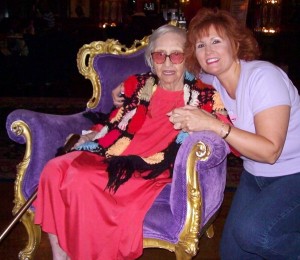‘Cause she’s so sweet (most of the time)! 😉 I interviewed my grandmother last week for an article that was published in this week’s Conyers/Covington News and Advertiser. She loves sharing stories about her childhood, and I thought it was interesting to hear about these things, particularly considering the state of our nation’s economy.
Click below to read it…
Conyers resident Estelle Sewick knows a thing or two about surviving tough economic times. Born in 1922 at her family’s cabin in the tiny mountain town of Ider, Alabama, Sewick grew up during the Great Depression.
But unlike many people struggling to make ends meet today, Sewick never recalls feeling poor. “My daddy owned 100 acres of land, and I still own 20 acres of it. To us, we were rich because we had all that land.”
Sewick was the third child born to Arthur and Ninnah Scott, and two younger brothers soon followed. Every member of the family worked hard to support the homestead.
“One of my first jobs was to milk the goats. Not everyone can milk a goat-you have to have little hands. My daddy did all kinds of work to support us. For a while, he worked clearing land for fifty cents a day. And after working hard from sunup to sundown, he still had to come home, take care of his horse, feed all the livestock and milk the cows.”
Sewick’s Grandpa Scott was the first person in town to own a truck. He also owned the local grocery store, saw mill, cane mill and cotton gin. The family grew cotton and sugar cane, and Sewick fondly recalls helping to harvest both crops.
“My sister Ruby and I made rag dolls and stuffed them with the cotton we picked. We made all of our toys back then-wooden swings, corn husk dolls, and the boys made toys out of old tin cans. We never threw away anything!” she laughed.
In addition to their cash crops, the Scotts kept a large vegetable garden, where Sewick learned the complexities of growing and harvesting vegetables.
“We grew squash, tomatoes, peppers, beans. We grew everything, and then we canned everything. Mama’s kitchen was stacked with hundreds of mason jars.” Sewick continued gardening and canning well into her sixties, far beyond the time that it was necessary to do so. “You just can’t buy anything at the store that tastes as good,” she explained.
When Sewick reached her early teens, she began venturing out to the nearest big city, Chattanooga, Tennessee. She worked as a car hop at a popular restaurant, earning 10 cents per day. “I was in hog heaven when someone left me a nickel tip!”
Her Uncle Kelly played the fiddle at a Chattanooga dance hall, and it was there that she caught the eye of a handsome solider. Mike Sewick was a “Yankee from New York City” and eight years her senior, but he was smitten with the pretty young country girl. They courted four years before marrying in 1941. Their first child, Mike Jr. was born ten months later. Mr. Sewick deployed to Europe to fight in WWII shortly after.
Life continued to be challenging for the young military wife and mother. Sewick’s second child, a daughter she named Ninnah in honor of her mother, was born after the war in 1946. Sgt. Sewick later served in the Korean War, while Estelle continued to hold down the home front in Atlanta. “We didn’t have direct deposit back then. Sometimes all we had to eat were beans and cornbread while waiting for that check to come.”
As the decades passed and modern conveniences became more affordable, the Sewicks maintained their frugal lifestyle. They prided themselves in never purchasing anything on credit. “It didn’t make sense to pay somebody else interest when we could save our money and use cash,” said Sewick. Due to diligent saving, they paid cash for their home when they moved to Conyers in 1975.
The couple even lived without air-conditioning until having it installed a few years prior to Mike Sewick’s death in 1999. Estelle Sewick continues to live without luxuries such as a cell phone or dishwasher.
“I’ve lived happily for 85 years without them,” she states proudly. Sewick encourages other people to talk to their elders and apply the wisdom they share to their own lives. “When you know what it’s like to do without, it makes you thankful for what you’ve got.”
